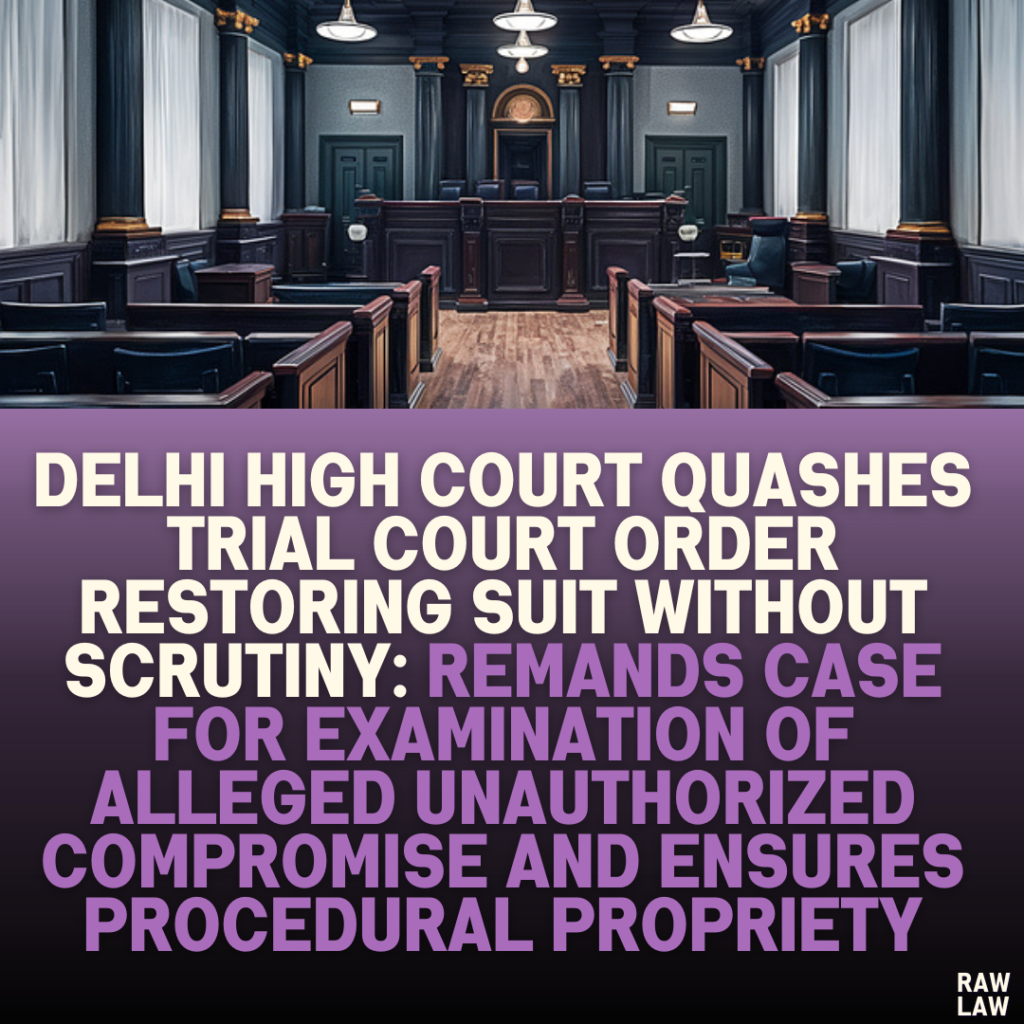Court’s Decision
The Delhi High Court quashed the Trial Court’s order dated April 21, 2022, which restored the suit based solely on allegations of unauthorized compromise. The High Court directed the Trial Court to conduct a thorough examination of the claims, ensuring that all relevant issues, including the validity of the alleged compromise, are addressed.
Facts
- Nature of the Suit:
- The original civil suit involved claims for partition, possession, declaration, and permanent injunction.
- The plaintiff and defendants reached a settlement agreement recorded in court on August 30, 2017, leading to the suit’s withdrawal.
- The agreement included terms that the plaintiff would receive ₹21,25,000 from the defendants, with timelines set for payment.
- Subsequent Allegations:
- The plaintiff later filed a review application under Section 151 of the Civil Procedure Code (CPC), alleging that:
- The settlement was unauthorized and made without consent.
- The plaintiff’s previous counsel misrepresented facts and recorded statements against the plaintiff’s wishes.
- Supporting this claim, the plaintiff initiated complaints against the previous counsel with the Bar Council of Delhi, the Bar Association, and local authorities.
- The plaintiff later filed a review application under Section 151 of the Civil Procedure Code (CPC), alleging that:
- Trial Court’s Order:
- The Trial Court restored the suit to its original number, finding it futile to examine the allegations since the Bar Council was already handling the disciplinary complaint against the advocate.
Issues
- Was the compromise valid, informed, and entered into with the consent of the plaintiff?
- Did the Trial Court err in relying on the Bar Council’s proceedings instead of addressing the allegations itself?
Petitioner’s Arguments
- The settlement was voluntarily agreed upon, and the statements of all parties were duly recorded in court.
- The Trial Court failed to provide proper reasoning for restoring the suit and overlooked the fact that the settlement was made with the free will of all parties.
Respondent’s Arguments
- The plaintiff was not informed of the implications of the settlement and was misled by their previous counsel.
- Being uneducated, the plaintiff could not understand the statements recorded in court or the consequences of withdrawing the suit.
Analysis of the Law
- Role of Judicial Scrutiny:
- When allegations of fraud or unauthorized compromise are made, it is the court’s responsibility to ascertain their validity.
- The Bar Council can only address professional misconduct and cannot decide on the merits of legal issues in a case.
- Duty of the Trial Court:
- The Trial Court should have examined whether the compromise was entered into with the plaintiff’s informed consent.
- By relying solely on the Bar Council’s inquiry and failing to investigate the claims independently, the Trial Court abdicated its judicial function.
- Recording of Statements:
- The High Court emphasized that the statements recorded during the settlement bore the parties’ signatures and were made in the presence of their advocates. This fact necessitated judicial scrutiny to determine if the statements were made voluntarily and with full understanding.
Precedent Analysis
The judgment did not cite specific case precedents but relied on principles of natural justice and procedural propriety.
Court’s Reasoning
- The Trial Court erred in mechanically restoring the suit without considering the core issues:
- Whether the plaintiff was fully aware of and consented to the settlement.
- Whether the allegations of fraud and unauthorized representation were substantiated.
- The High Court clarified that:
- The Bar Council’s role is limited to examining professional misconduct and does not extend to determining the truth of allegations affecting the parties’ legal rights.
- The Trial Court should have independently investigated the allegations before passing its order.
Conclusion
The High Court remanded the matter to the Trial Court for fresh consideration, directing it to:
- Reassess the review application on its merits.
- Address all relevant aspects, including the validity of the alleged compromise.
- Ensure its decision is uninfluenced by any observations made in the High Court’s order.
The parties were directed to appear before the Trial Court on January 15, 2025.
Implications
This judgment emphasizes the judiciary’s obligation to:
- Protect litigants from potential fraud or misrepresentation, particularly when allegations are made against legal counsel.
- Conduct an independent judicial inquiry into claims affecting the validity of a recorded settlement.
- Avoid over-reliance on disciplinary bodies like the Bar Council when legal rights and obligations are at stake.
The judgment serves as a precedent for ensuring procedural propriety in cases involving allegations of unauthorized compromises.
